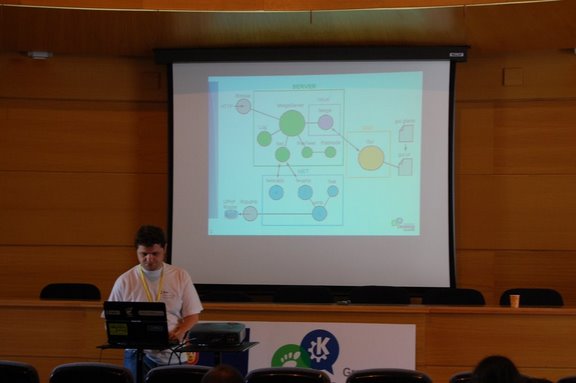This has been a very intense week at Gran Canaria Desktop Summit. I’m very glad about the good reception that Meiga talk had among the Gadec-ES public. Now it’s time for taking advantage of all this work and update the Meiga website with the slides prepared for the talk. I’m sure that anyone wanting to contribute or to understand the project will find valuable information on them.

But not everything has been about explaining our work. I’ve learnt a lot of new things and found new ideas to improve Meiga in the future. I’m not going to talk here about the rest of the talks given by Igalia people. You can read about that on the planet. I prefer to focus on some of the other most interesting talks I’ve attended to:
- Profiling and Optimizing D-Bus APIs (Will Thompson): Will showcased a graphical profiling tool that shows that D-BUS can be a slow protocol when there is a high amount of calls. One alternative to speed up things is to expose methods to do vectorized calls, performing multiple queries and getting multiple results at once, instead of doing N consecutive calls.
- Sipping Mojitos and thinking RESTful thoughts (Rob Bradford): Rob spoke about Mojito, an interesting library to access remote REST web services in a convenient way.
- I can has aliens too? Client side windows in Gtk+ (Alexander Larsson): Alex and his workgroup are making the effort to collapse some X-Window windows into a single big one managed by the client. This reduces flicker and has interesting applications for offscreen rendering.
- Thinking Outside The Box (Bringing the Network back into GNOME) (John Palmieri): Apart from being a good guitar player, John reflected about some interesting ways for the desktop apps to interact with online services. It’d been nice to integrate the Meiga ideas of “offering directly from the desktop” instead of relying on central services, as he exposed.
- Vala: Compiler for the GObject type system (Jürg Billeter): The Vala author showed the language I’m in love with. Apart from the already known features, I could see the new asynchronous programming features, which implement coroutines in some way. This concept is a very interesting tool to do clean asynchronous programming and could solve one of the problems I found in Meiga when coding a serie of asynchronous action. My alternative was to code a programmable step interpreter.
- The Hynerian Empire and beyond (Zeeshan Ali): Zeeshan showed us the features of Rygel, a UPnP media server for Gnome.
- Let’s make GNOME a collaborative desktop (Guillaume Desmottes): People is using Telepathy (XMPP) to exchange not only messages, video and audio, but also files and using the framework for other kind of communication/sharing uses between applications.
- Personal Media Networks with Coherence and Telepathy D-Tubes (Philippe Normand): This guy demonstrated Coherence, a framework that is able to link two UPnP networks (eg: two homes) by using one of the UPnP devices in each network as a proxy. This proxy would forward the UPnP messages encapsulating them into DBUS calls and transmitting them over the Internet using D-Tubes, a networked implementation of DBUS. This D-Tubes technology also appeared in other talks and seems to be very interesting.
- How to play libnice-ly with your NAT (Youness Alaoui): This guy explained how libnice uses NAT punching to make NAT traversal possible for UDP packets. They are currently trying to make it work for TCP also, which would be of immediate application on Meiga. Anyway, in that talk I knew about the existence of TURN servers that play the role of a central communication point as a last resort when direct visibility isn’t available between the peers.